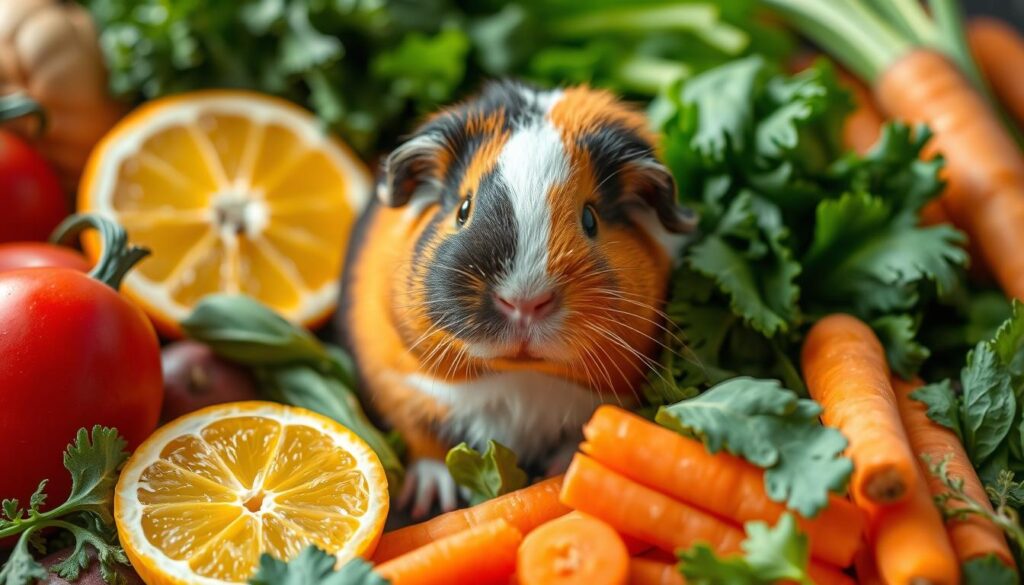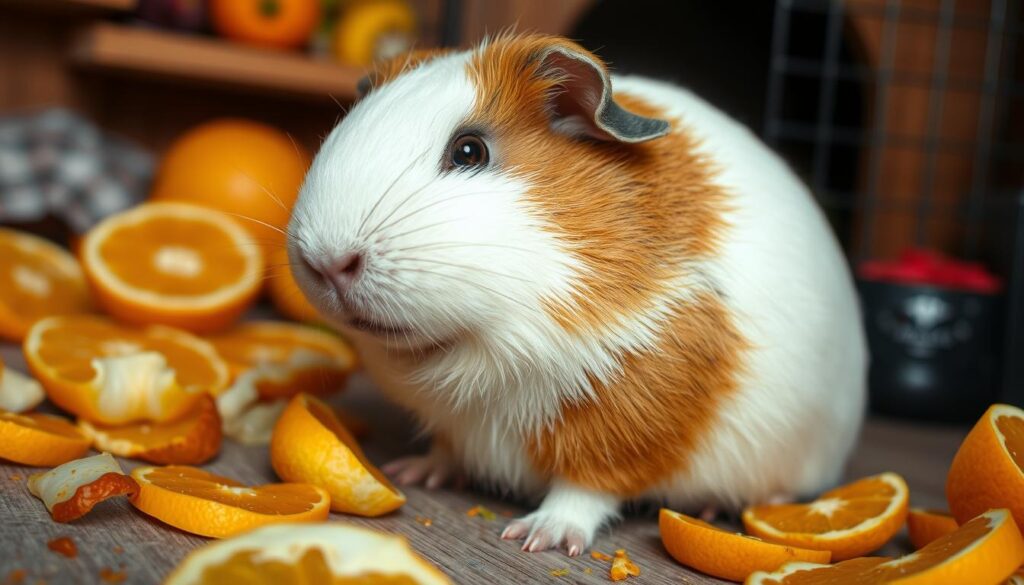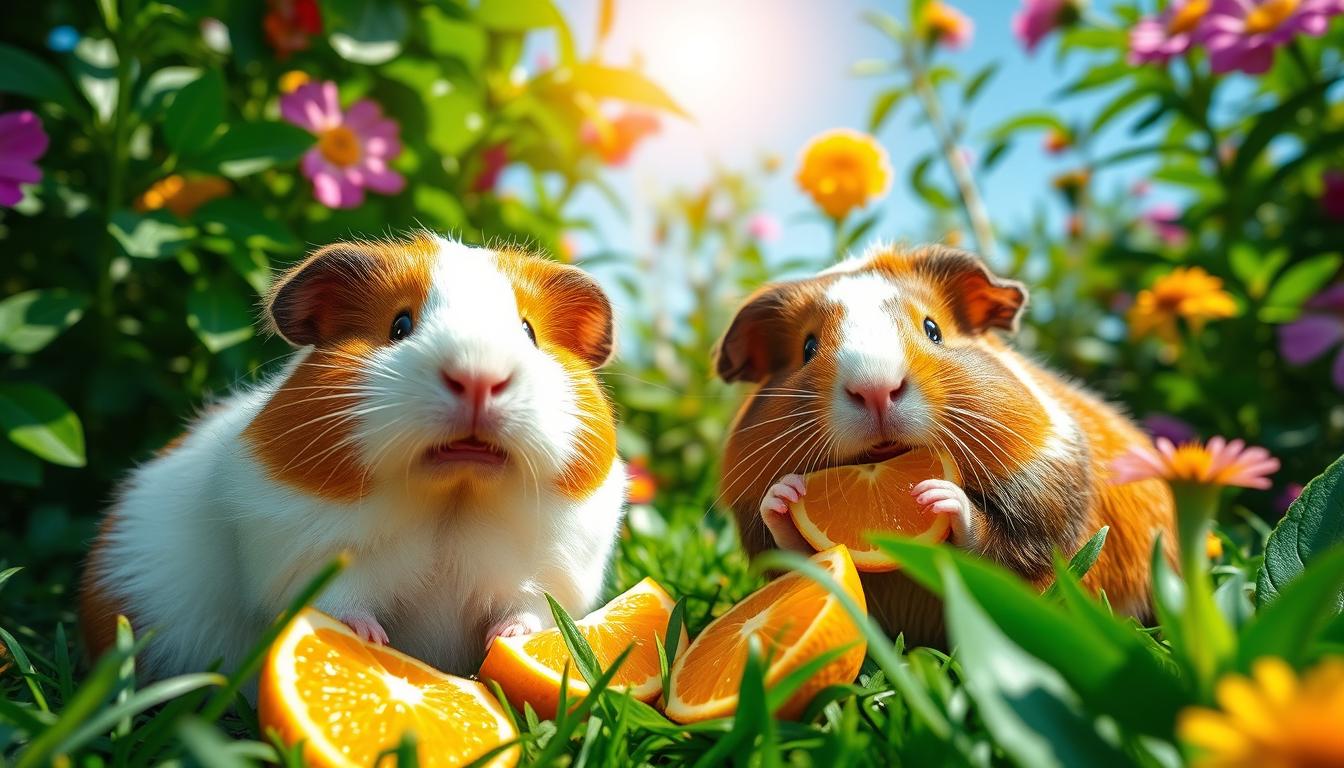I’ve always wondered about my guinea pigs’ diet. Can they have oranges, or are they off-limits? This guide will help you know if oranges are safe for your furry friends.
Guinea pigs need a special diet to stay healthy. We’ll look into what they should eat and if oranges are good for them.
Table of Contents
Understanding Guinea Pig Nutrition Basics
Caring for a guinea pig means knowing their special diet needs. These cute animals eat a lot of fiber and not much fat, sugar, or carbs. It’s key to give them the right food to keep their teeth, digestion, and health in check.
Essential Nutrients for Guinea Pigs
Guinea pigs need vitamin C, calcium, magnesium, and phosphorus. They can’t make vitamin C themselves, so they must get it from food. Calcium and phosphorus help their bones and teeth stay strong. Magnesium is important for energy and muscle work.
Daily Dietary Requirements
- Unlimited high-quality hay (comprising around 80% of their diet)
- 1 cup of fresh vegetables per guinea pig
- 2 tablespoons of high-quality guinea pig pellets per guinea pig
The Importance of Balanced Diet
A balanced diet is vital for guinea pigs. Eating hay helps wear down their teeth, which grow all the time. This prevents dental pain. Hay also helps their sensitive stomach.
Adding the right veggies and a bit of pellets gives them all the nutrients they need. This helps them stay healthy and happy.
Can Guinea Pigs Eat Oranges
Yes, guinea pigs can enjoy oranges as an occasional treat. Oranges, along with other citrus fruits, are good for them in small amounts. But, it’s best to avoid lemons and limes because they can upset their stomachs and cause mouth sores.
Oranges are a good source of vitamin C for guinea pigs. They need this vitamin, which they can’t make on their own. Pregnant and nursing guinea pigs need even more vitamin C.
Remember, oranges should only be a small part of their diet. They should make up no more than 10% of what they eat each day. Too much vitamin C can cause problems like kidney stones.
| Nutrient | Amount per 100g of Orange |
|---|---|
| Vitamin C | 53.2mg |
| Vitamin A | 190IU |
| Potassium | 181mg |
| Fiber | 2.4g |
Make sure to give your guinea pig fresh oranges, not canned ones. Canned oranges have added sugars and preservatives that are bad for them. Also, don’t let them eat orange seeds, juice, or marmalade.
In short, guinea pigs can have oranges but only in small amounts. Make sure they get a balanced diet with oranges being just a small part of it.
Health Benefits of Oranges for Guinea Pigs
Guinea pigs need a balanced diet to stay healthy. Oranges are a great fruit for them. They are full of vitamin C, which helps their immune system and prevents scurvy.
Vitamin C Content and Its Importance
Guinea pigs can’t make vitamin C on their own. They need to get it from food, and oranges are a good source. Eating oranges helps them get enough vitamin C, which is important for them.
Other Beneficial Nutrients
Oranges have more than just vitamin C. They also have dietary fiber for digestion and potassium for heart and muscle health. Plus, they have antioxidants that protect cells from damage.
Antioxidant Properties
The antioxidants in oranges, like vitamin C and carotenoids, help keep guinea pigs healthy. They fight off free radicals, which can cause inflammation and harm. This may help guinea pigs stay healthy longer.
Adding oranges to a balanced diet for guinea pigs is a good idea. But, start with small amounts to see how they like it. This ensures they can handle the fruit.
Safe Serving Sizes and Frequency
Feeding your guinea pig oranges should be done with care. Oranges are best given as treats, not as a main part of their diet. A small wedge or a few segments is enough, and they should only get this once a day or a few times a week.
Oranges have a lot of sugar, which can be bad for guinea pigs if they eat too much. Eating too much can cause weight gain and stomach problems. Watch your pet closely after giving them oranges to see if they have any bad reactions, especially to the acidity in citrus fruits.
- Serve a small wedge or a few segments of orange as a treat, no more than once a day or several times a week.
- Moderation is crucial due to the high sugar content in oranges.
- Monitor your guinea pig for any signs of digestive distress or allergic reactions after feeding oranges.
“A balanced diet is essential for the health and well-being of your guinea pig. Oranges should be offered in moderation as part of a varied, nutritious meal plan.”
While oranges can be good for your guinea pig, they shouldn’t be the main part of their diet. Their diet should mostly be hay, pellets, and fresh veggies. By following these tips, you can give oranges to your guinea pig as a healthy treat now and then.
Potential Risks and Precautions
Oranges can be good for your guinea pig, but you need to watch out for risks. Guinea pigs need special care to stay healthy. It’s important to be careful when adding oranges to their diet.
Sugar Content Concerns
Oranges have a lot of sugar, which can be bad for guinea pigs. Eating too many oranges can cause weight gain and dental problems. Make sure to give them oranges in small amounts and a balanced diet.
Digestive Issues
Some guinea pigs might get upset stomachs or diarrhea from oranges. Their digestive systems can’t handle the acidity and water in oranges well. Watch how they react to new foods and talk to a vet if you’re worried.
Allergic Reactions
Guinea pigs can have allergic reactions to oranges or other citrus fruits. This can cause skin problems, breathing issues, or other symptoms. Watch your pet closely when they try oranges for the first time.
Always put your guinea pig’s health first when thinking about their food. Knowing the risks and taking steps to avoid them can help. This way, your pet can enjoy oranges safely.

How to Prepare Oranges for Your Guinea Pig
Adding the right fruits to your guinea pig’s diet can be fun. Oranges are a great choice because they’re full of benefits. But, it’s important to prepare oranges safely for your pet. Let’s look at how to make sure your guinea pig enjoys oranges.
- Thoroughly Wash the Orange: Start by washing the orange under running water to remove any potential pesticides or contaminants. This step is essential to ensure your guinea pig’s safety and well-being.
- Remove the Peel and Seeds: Guinea pigs should not consume the orange peel or seeds, as they can pose a choking hazard or cause digestive issues. Carefully peel the orange and discard the peel.
- Cut into Bite-Sized Pieces: Once the orange is peeled, cut it into small, manageable pieces that are appropriate for your guinea pig’s size. This will make it easier for your pet to chew and digest the fruit.
- Offer Fresh and High-Quality: Always provide your guinea pig with the freshest, highest-quality oranges to ensure they receive the maximum nutritional benefits and minimize any potential risks.
By following these simple steps, you can safely and effectively incorporate oranges into your guinea pig’s diet as a healthy snack. Remember, moderation is key, as fruits like oranges should only make up a small portion of your pet’s overall balanced diet.
| Fruit | Safety for Guinea Pigs | Serving Frequency |
|---|---|---|
| Apples | Safe, including the skin and leaves | Once or twice a week |
| Watermelon | Safe, but remove the seeds | Occasional treat |
| Grapes | Safe in moderation | A few times a week |
| Strawberries | Safe | A few times a week |
| Bananas | Safe in moderation | Occasional treat |
| Blueberries | Safe in moderation | Once or twice a week |
| Oranges | Safe in moderation | Once or twice a week |
Remember, when it comes to feeding your guinea pig, always prioritize their health and safety. By following these pet care tips and serving the right fruit for guinea pigs in appropriate portions, you can ensure your furry friend enjoys a healthy snack that contributes to their overall well-being.
Other Citrus Fruits Safe for Guinea Pigs
Oranges are a favorite citrus treat for guinea pigs, but they’re not the only choice. Other citrus fruits can also be part of their diet. They add variety and nutrients.
Comparing Different Citrus Options
Satsumas, tangerines, and clementines are also good for guinea pigs. They are less acidic and sweeter than oranges. The fiber in citrus peels is also good for their digestion.
Safe and Unsafe Varieties
- Safe Citrus Fruits: Oranges, satsumas, tangerines, clementines, and blood oranges are all safe options for guinea pigs, as they offer similar nutritional profiles and lower acidity levels.
- Unsafe Citrus Fruits: Highly acidic citrus fruits, such as lemons and grapefruits, should be avoided as they can cause digestive issues in guinea pigs.
When adding new citrus fruits to your guinea pig’s diet, start with small amounts. Watch how they react. Slowly introducing new treats helps avoid any bad effects.
| Citrus Fruit | Vitamin C (per 100g) | Fiber (per 100g) | Sugar (per 100g) | Suitability for Guinea Pigs |
|---|---|---|---|---|
| Orange | 43 mg | 2.2 g | 8.5 g | Suitable |
| Satsuma | 35 mg | 1.8 g | 6.2 g | Suitable |
| Tangerine | 26 mg | 1.2 g | 8.0 g | Suitable |
| Clementine | 36 mg | 1.6 g | 9.2 g | Suitable |
| Lemon | 53 mg | 2.8 g | 2.5 g | Not Suitable |
| Grapefruit | 38 mg | 1.6 g | 8.1 g | Not Suitable |
Knowing which citrus fruits are safe for your guinea pig helps you give them a balanced diet. This keeps them happy and healthy.
Incorporating Oranges into a Balanced Diet
As a pet owner, it’s key to know oranges should be part of a varied diet for your guinea pig. Oranges can add valuable nutrients but shouldn’t be the main food. Mix oranges with other safe fruits to give your pet a wide range of vitamins, minerals, and antioxidants.
Experts say treats, like oranges, should not be more than 10% of your guinea pig’s daily food. Their diet should mainly be high-quality hay and fresh veggies.
Balancing Oranges with Other Healthy Snacks
Along with oranges, add other nutritious fruits and veggies to your guinea pig’s diet. Some good options are:
- Apples (remove seeds and core)
- Berries (strawberries, blueberries, raspberries, and blackberries)
- Watermelon (remove seeds and offer seedless slices)
- Kiwi (peeled and sliced)
- Mango (remove pit and offer small, peeled slices)
- Pineapple (fresh chunks, avoiding canned varieties with added sugars)
- Pears (sliced with seeds removed)
By switching between these snacks, you can meet your guinea pig’s pet nutrition needs. This keeps their guinea pig diet balanced and fun.
Remember, it’s all about moderation with treats, including oranges. Talk to your vet to find out the right amount and how often to give healthy snacks to your pet.
Signs of Orange Overconsumption
It’s important to watch how your guinea pig reacts to oranges. Oranges can be good for them, but too much can cause problems. Look out for signs of overconsumption like diarrhea, bloating, changes in appetite, or odd behavior.
If your guinea pig shows these signs after eating oranges, cut back or stop oranges in their diet. Always check your pet’s weight and health to keep their diet right for them.
Remember, caring for exotic pets like guinea pigs needs careful balance. Adding new foods, even healthy ones, should be done slowly and in small amounts. Watching how your guinea pig reacts helps keep their guinea pig diet safe and healthy.

Keeping a close eye on your guinea pig’s reaction to oranges is key to good exotic pet care. By paying attention to their needs and adjusting their diet, you can make sure they live a happy, healthy life.
Alternative Vitamin C Sources
Oranges are not the only source of vitamin C for your guinea pig. [https://supremepetfoods.com/blog/why-do-guinea-pigs-need-vitamin-c/]Fruits like kiwi, strawberries, and papaya are also rich in this vitamin. Vegetables such as bell peppers, kale, and parsley are great options too. If needed, you can also add commercial vitamin C supplements made for guinea pigs to their diet.
It’s key to talk to a vet to make sure your guinea pig gets enough vitamin C. Too much can be bad, so finding the right amount is important. Luckily, there are many ways to keep your guinea pig healthy and happy.
Vitamin C-Rich Fruits and Vegetables
- Kiwi
- Strawberries
- Papaya
- Bell peppers
- Kale
- Parsley
Commercial Vitamin C Supplements
If fresh food alone isn’t enough, consider a vitamin C supplement made for guinea pigs. Always check with your vet before adding any new supplements. This ensures the right amount and safety for your pet.
| Product | Vitamin C Content | Recommended Serving |
|---|---|---|
| Oxbow Vitamin C Supplement | 200 mg per tablet | 1/2 to 1 tablet per day |
| Kaytee Vitamin C Supplement | 100 mg per tablet | 1 to 2 tablets per day |
| Small Pet Select Vitamin C Drops | 50 mg per drop | 5 to 10 drops per day |
Always work with your vet to find the best vitamin C sources and supplements for your guinea pig. With the right plan, your pet will stay healthy and full of energy.
Conclusion
Guinea pigs can safely eat oranges as part of a balanced diet. They should be introduced slowly and in small amounts. Oranges are rich in vitamin C, which is good for their health.
But, oranges have a lot of sugar. This can cause stomach problems or weight gain. So, it’s important to watch how much they eat.
When giving oranges to your guinea pig, make sure to peel and cut them up. This makes it easier for them to digest. Also, watch for any signs of allergy or eating too much. If you’re worried, talk to your vet.
By following these tips, you can give your guinea pig oranges as a healthy treat. A good diet includes fresh veggies, hay, and some pellets. Occasional fruits like oranges are okay too.
With the right care and diet, your guinea pig can live a long, happy life. Make sure to meet their nutritional needs and they’ll thrive.


2 thoughts on “Can Guinea Pigs Eat Oranges – Safe Feeding Guide”